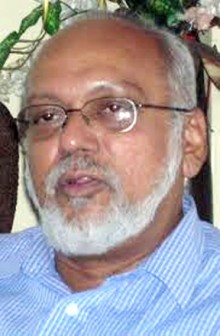PPP/C presidential candidate Donald Ramotar is to be the country’s next president, the Guyana Elections Commission announced at around 4.20 pm.
The ruling party will however not control Parliament having fallen just short of a majority. It secured 48.6% of the vote while the APNU captured 40.8% and the AFC 10.3%.
The PPP/C has secured 32 seats, A Partnership for National Unity 26 seats and the Alliance For Change, seven seats. It means the PPP/C lost four seats compared to its showing in 2006 while APNU – of which the PNCR is the main constituent – gained four more seats than the PNCR had in 2006. The Alliance For Change gained two seats while The United Force lost its one seat and GAP-ROAR which held one seat did not contest the elections.
This is the fifth general election in a row that the PPP/C has won following big wins in 1992, 1997, 2001 and 2006. This however is the first result below 50%.
For the second election in a row, the PPP/C lost substantial support in terms of the numbers of voters who turned out. At this election 166,340 people voted for it compared to 183,887 in 2006 – a loss of around 17,000 votes. It also lost 27,000 votes between 2001 and 2006 meaning that since 2001, 44, 000 voters have deserted it. On the other hand, APNU gained 25,000 votes over the PNCR’s showing in 2006, moving from 114,608 to 139,678. The AFC also increased its tally from 28,360 to 35,333.
PPP/C not controlling Parliament means that it will need one of the opposition groups to support its measures in Parliament.
It will also be vulnerable to a motion of no confidence which if successfully passed would unseat the government and fresh elections would have to be called.
The closeness of the result, according to observers, explains why the PPP/C was so keen on a recount and revisiting spoilt votes. They however would have needed 5,265 votes from the spoilt ballots or from other parties to succeed. The party withdrew its application for a recount of votes after it was accused of delaying the results process.
Voter turnout was 72.91%, above 2006’s figure of 69% but not as high as some had anticipated it would. It means that 129,000 eligible voters did not bother to cast ballots.
Political analysts say that despite its winning of the presidency, the PPP/C would be disappointed by the result. It spent hundreds of millions on the campaign with high-flying entertainers and glitzy rallies but still fell well below its 2006 figure. It was also accused of using state resources to bribe voters, notably handing out flood relief from its party’s headquarters at the start of its election campaign in Lethem, Region 9.
Analysts say it is likely a combination of apathy and disaffection with the party contributed to a significant decline in support. Opposition parties had also hammered the PPP/C and President Bharrat Jagdeo over his extensive pension package, questionable deals with investors and links between his government and convicted drug lord Roger Khan.
The new parliamentary configuration reflects a sea change in Guyana’s politics. Not since 1964 when the UF combined with the PNC to form a government despite the PPP having the largest single bloc of votes are two opposition parties in a position to control Parliament.
Political analysts say it presents a raft of opportunities for the parties to work together on a common legislative programme or make compromises on what priorities should be in place. For instance, APNU and the AFC have made it clear that they want the President’s pension package revisited and controversial deals like the Amaila hydropower project reviewed. They also want a full investigation of alleged links between the Jagdeo administration and the drug lord Khan. In exchange for concessions they may then offer support to the government in relation to its budget and other measures.
The analysts say the possibility of further constitutional change also looms large. The opposition are keen on further paring of the power of the presidency and removing the immunity of the President.
When Parliament convenes, the first challenge for the new government will be the election of a Speaker. It will need to offer a candidate who would be acceptable to one of the two opposition groups in Parliament.
It would also have to be wary of Article 106 (6) which says “The Cabinet including the President shall resign if the Government is defeated by the vote of a majority of all the elected members of the National Assembly on a vote of confidence”.
If this were to happen elections have to be called within three months.










